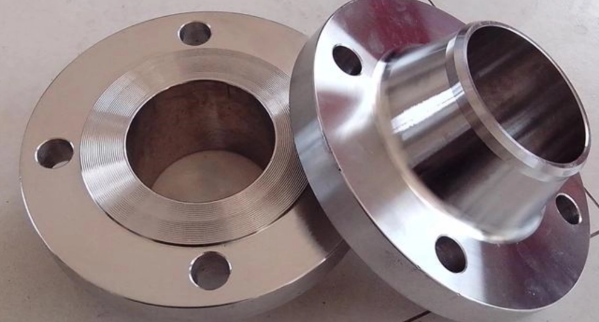Thick-walled flanges are key components used in the industrial field for connecting pipelines, pressure vessels and equipment. Their design features are that the wall thickness is significantly greater than that of standard pipe flanges, and they can withstand higher pressures, temperatures and mechanical stresses. The following are their core characteristics, forging processes and typical applications:
Basic definition and classification of thick-walled flanges:
1. Special flanges made by integral forging or welding processes, with wall thickness significantly exceeding that of standard flanges by 30%-50%
2. According to the structure, they can be divided into two categories: integral forging type and multi-layer cladding type

Analysis of core performance characteristics:
1. Mechanical performance performance
• Pressure bearing capacity reaches above PN160, which is 2-3 pressure levels higher than ordinary flanges
• Ring stiffness is increased by 40%, which can effectively resist alternating stress
• Due to the increase in wall thickness, the bearing capacity is significantly improved, and it is suitable for high pressure, high temperature (such as more than 500℃) or extreme low temperature environments (such as LNG storage and transportation).
• The thickened structure reduces the risk of flange deformation under cyclic loads (such as chemical equipment with frequent start-up and shutdown) and extends the service life.
2. Excellent sealing performance
• Metal ring gaskets or wound gaskets are used, combined with precision-machined sealing surfaces (such as raised surface RF, ring connection surface RTJ) to ensure leakage prevention under harsh working conditions.
3. Material adaptability requirements
Flange materials are mostly made of carbon steel, alloy steel or stainless steel, and the mechanical properties are enhanced by heat treatment.
• Carbon steel material is suitable for working conditions below 480℃
• Alloy steel can withstand high temperature environment of 560℃
• Stainless steel models have corrosion resistance of CR≥17%
4. Customized design
• Flange neck height, bolt hole distribution, etc. can be adjusted according to needs to adapt to non-standard pipelines or special equipment (such as nuclear power reactors).
Forging process:
Forging process requirements for thick-walled flange forgings:
1. Use multiple forgings and gradual deformation to avoid excessive cooling and excessive heating.
2. Control the forging temperature and speed to avoid cracks and deformation.
3. Use suitable forging dies and forging equipment to ensure product accuracy and quality.
4. Before subsequent processing, surface treatment and removal of forging residual stress must be performed.
Heat treatment:
Heat treatment requirements for thick-walled flange forgings:
1. Perform uniform heating and temperature maintenance to ensure grain refinement and uniform organization of the material.
2. Perform appropriate cooling and tempering treatment to ensure the strength and toughness of the material.
3. Control the temperature and time during the heat treatment process to avoid defects such as transitional organization and cracks.
Typical application scenarios and technical advantages:
1. Applications in extreme working conditions
• Natural gas compressor outlet pipeline (working pressure 25MPa), high-pressure transmission pipeline, drilling platform wellhead device.
• Refinery hydrogenation reactor inlet and outlet (temperature 400℃+)
• Nuclear power: The reactor pressure vessel is connected to the main steam pipeline and must meet radiation resistance requirements.
• Thermal power: High-temperature steam pipeline flanges, materials are often made of heat-resistant steels such as 12Cr1MoV.
• Chemical and petrochemical: High-pressure equipment such as hydrogenation reactors and synthesis towers must resist H₂S corrosion.
Corrosive media pipelines (such as sulfuric acid, alkali solution) use plastic-lined flanges or super austenitic stainless steel.
• Heavy machinery and ships:
Large hydraulic systems (such as forging presses) and ship propulsion shaft flanges are subject to alternating torque and vibration.
• Special environments:
Deep cold equipment (LNG storage tanks) and aerospace engine pipelines require low-temperature toughness or lightweight design (such as titanium alloy flanges).
2. Operation and maintenance value
• The life of the sealing surface is extended to 8-10 years (3-5 years for ordinary flanges)
• Reduce maintenance downtime by more than 60%
Selection and quality control points:
1. Must comply with ASME B16.47,
ASME B16.5, EN 1092-1 or GB/T 9124 standards
2. Manufacturing process: mainly forging (free forging/die forging), large flanges may be cast + machined, and welds require 100% radiographic inspection.
3. Ultrasonic flaw detection is required to reach level II qualification
4. Post-weld heat treatment (PWHT) is required for high temperature working conditions
5. Failure prevention: stress concentration (such as transition fillet design), corrosion fatigue (adding anti-corrosion coating) and thermal expansion difference (using flexible flange structure) need to be analyzed.
Why are steel flanges of different thicknesses?
The different thicknesses of
pipe flanges are mainly due to the different working pressures and temperatures of the connected equipment. Generally, high-pressure and high-temperature equipment requires thick-walled flanges, while low-pressure and low-temperature equipment can use thin-walled flanges.
1. Thick-walled flanges
Thick-walled flanges are mainly used under high temperature and high pressure conditions. Since pipelines are easily deformed, if thin-walled flanges are used under high pressure and high temperature conditions, safety hazards such as flange deformation and leakage may occur. In order to ensure safety, it is necessary to use thick-walled flanges.
2. Thin-walled flanges
Thin-walled flanges are mainly suitable for low temperature and low pressure conditions. The main advantages of thin-walled flanges are lightness and low cost, which are suitable for pipeline connections in general industrial fields.
In key facilities such as LNG receiving stations and nuclear power main pipelines, the correct selection of thick-walled flanges can significantly improve system reliability. Its excellent creep resistance and fatigue strength make it the preferred connection solution for high-pressure pipelines. When selecting, it is necessary to comprehensively consider operating parameters, material compatibility and cost, and perform stress simulation verification when necessary.
Read more: Standard sizes of pipe flanges or Types and specifications of forged flanges


